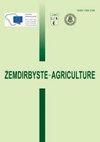Enhancement of maize seed viability after cold storage and induced senescence by priming with synthetic cytokinins
IF 0.8
4区 农林科学
Q3 AGRICULTURE, MULTIDISCIPLINARY
引用次数: 0
Abstract
Maize ( Zea mays L.) plants were treated with synthetic cytokinins – 6-benzylaminopurine (BAP) and 6-furfurylaminopurine, or kinetin (KIN) – during the grain filling stage in a field experiment performed in 2020 in Sadovo, central Bulgaria. The objective was to study their effect on plant productivity and seedling viability of maize after cold storage. The morpho-physiological parameters of the leaves assessed 15 days after cytokinin priming showed an increase in biosynthetic processes compared to control plants. Analysis of yield parameters at harvesting revealed improved productivity of cytokinin-treated plants, which was evidenced as 10 mg L −1 KIN, and BAP priming resulted in, respectively, 18% and 16% higher grain mass compared to untreated plants (control). The produced seeds were exposed to cold storage (−18°C) for 12 months and afterwards physiological parameters of 5-day-old seedlings were measured to evaluate exogenous cytokinins’ impact upon stress alleviation. The seedlings developed from cytokinin-treated plants accumulated significantly lower amounts of oxidative stress markers (hydrogen peroxide and malondialdehyde) after cold storage. In a laboratory experiment, maize seeds were subjected to artificially induced senescence (AIS) test for 72 h at 41°C temperature and were subsequently soaked in cytokinin solutions. Cytokinins had a positive effect on both physiological parameters of seedlings of field-grown plants after cold storage and improved the performance of seedlings after AIS test through increased oxidative stress protection and enhanced reactive oxygen species (ROS) detoxification.合成细胞分裂素对提高玉米种子冷藏后活力和诱导衰老的影响
2020年,在保加利亚中部萨多ovo进行了玉米(Zea mays L.)灌浆期的田间试验,采用合成细胞分裂素- 6-苄基氨基嘌素(BAP)和6-糠醛氨基嘌素或动素(KIN)处理玉米植株。目的是研究它们对冷藏后玉米植株生产力和幼苗活力的影响。细胞分裂素启动15天后叶片形态生理参数的评估显示,与对照植物相比,生物合成过程有所增加。收获时的产量参数分析显示,细胞分裂素处理植株的产量有所提高,10 mg L−1的KIN和BAP分别使植株的籽粒质量比未处理植株(对照)提高18%和16%。将生成的种子冷藏12个月(- 18°C),然后测量5天大幼苗的生理参数,以评估外源细胞分裂素对应激缓解的影响。细胞分裂素处理后的幼苗在冷藏后积累的氧化胁迫标志物(过氧化氢和丙二醛)显著降低。在实验室实验中,将玉米种子在41°C温度下进行人工诱导衰老(AIS) 72 h,然后将其浸泡在细胞分裂素溶液中。细胞分裂素对大田植物冷藏后幼苗的生理参数均有积极影响,并通过增加氧化应激保护和增强活性氧(ROS)解毒来改善AIS试验后幼苗的性能。
本文章由计算机程序翻译,如有差异,请以英文原文为准。
求助全文
约1分钟内获得全文
求助全文
来源期刊

Zemdirbyste-agriculture
AGRICULTURE, MULTIDISCIPLINARY-
CiteScore
1.80
自引率
11.10%
发文量
36
审稿时长
>12 weeks
期刊介绍:
Zemdirbyste-Agriculture is a quarterly scientific journal which covers a wide range of topics in the field of agricultural sciences, agronomy. It publishes articles of original research findings in the English language in the field of agronomy (soil and crop management, crop production, plant protection, plant breeding and genetics, biotechnology, plant nutrition, agrochemistry, soil science, microbiology etc.) and related areas. Articles are peer-reviewed. Review, debating papers as well as those of a methodological nature will also be considered.
 求助内容:
求助内容: 应助结果提醒方式:
应助结果提醒方式:


